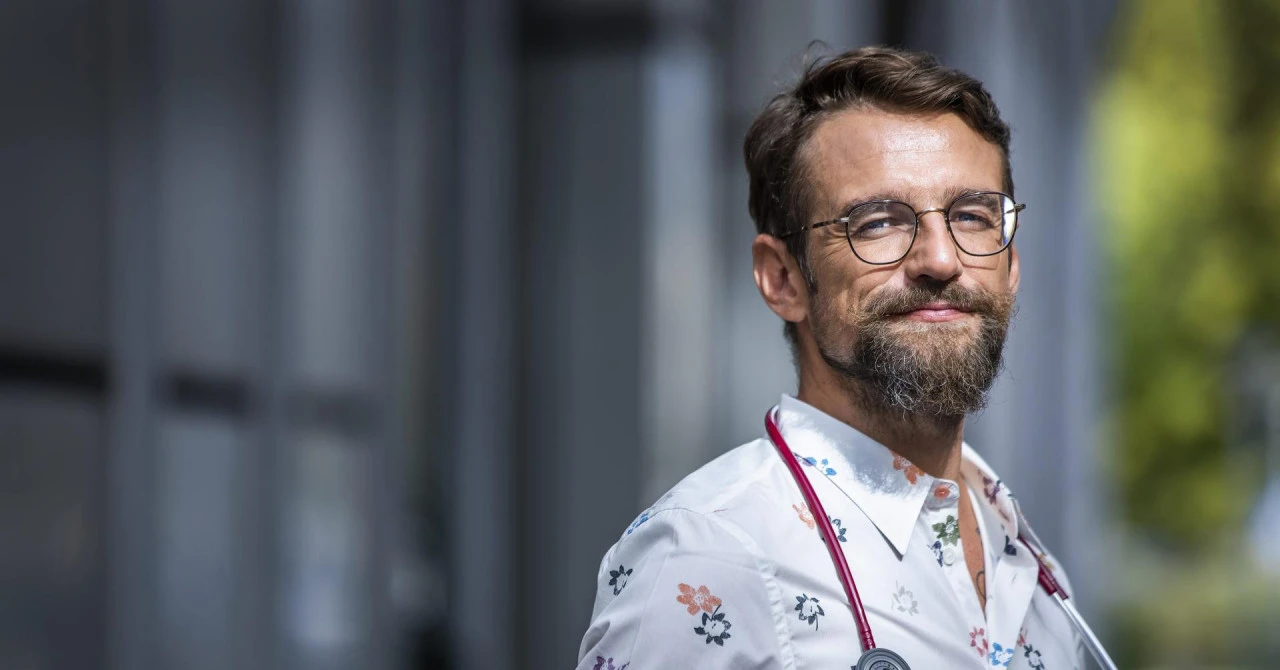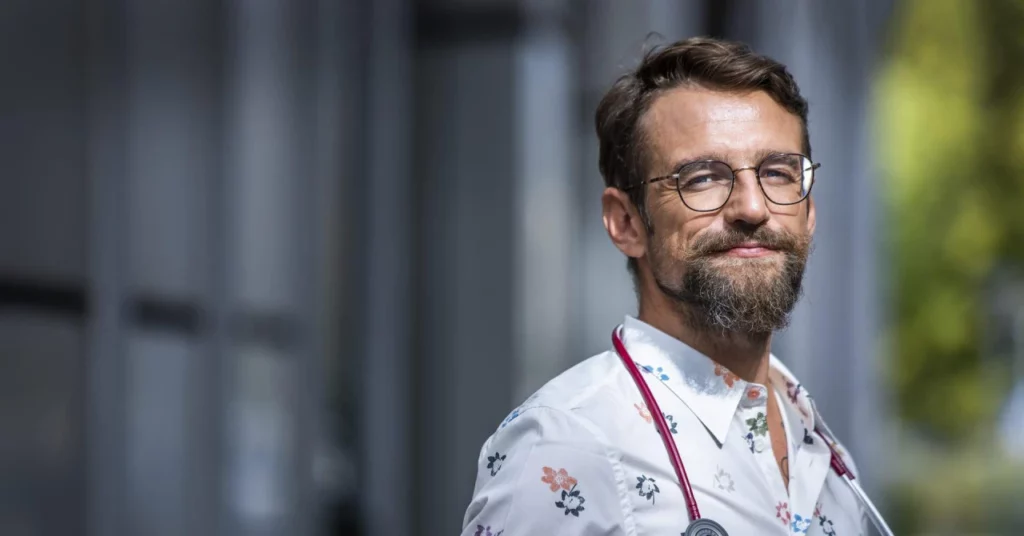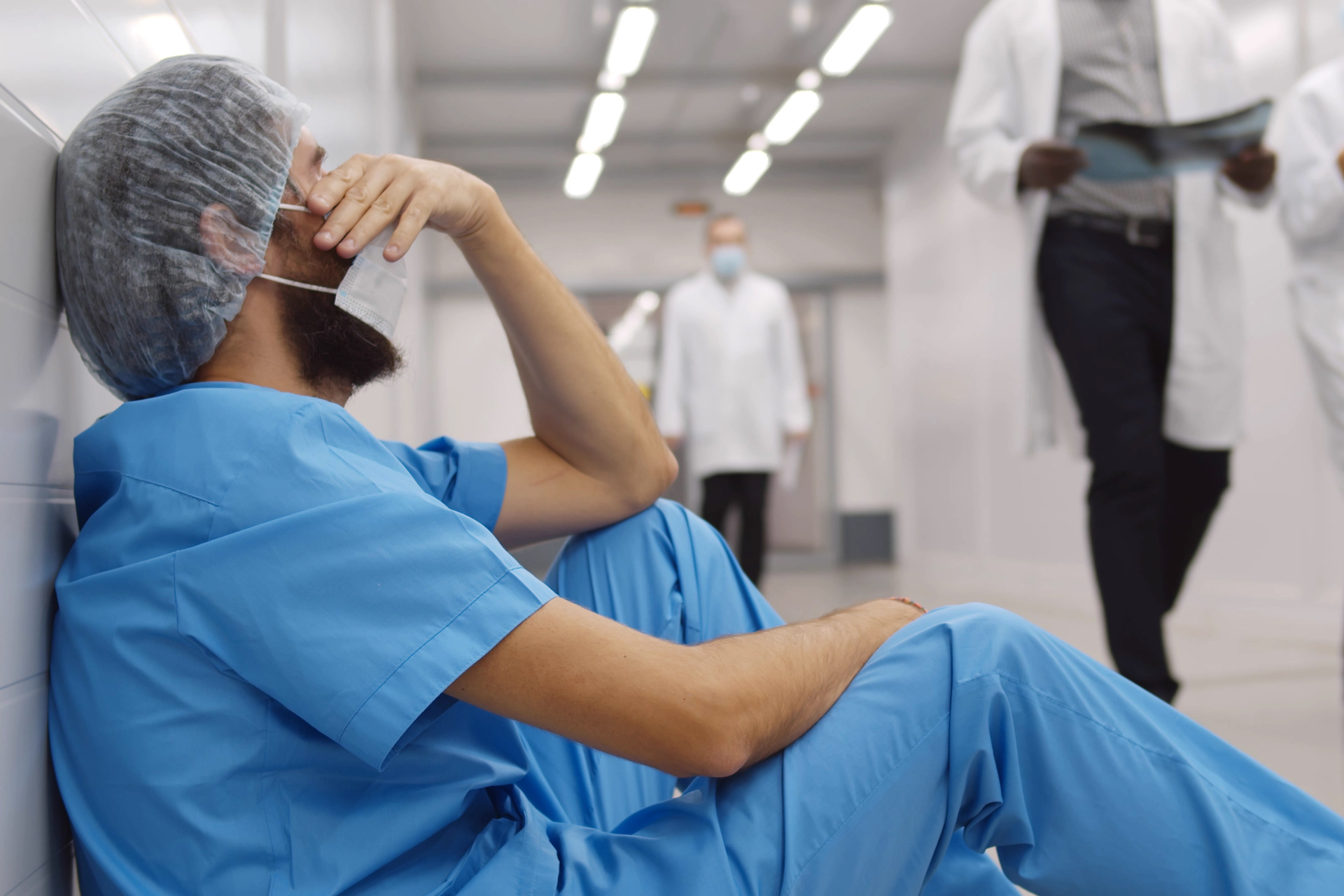An invisible scourge is quietly wreaking havoc on doctors and medical staff alike, with Dr. Beck sharing, “I walked out of the hospital like a zombie…”
Microsleeping, when a person falls asleep from exhaustion for a few seconds without being aware of it, is one of the most common causes of accidents among shift workers. “One morning after a 24-hour shift, I was driving home. The first winter rain was falling. A man in the car next to me was turning left in front of me and slightly entered my lane. My reaction was completely inappropriate. It was as if I wasn’t present. I skidded and ended up on the sidewalk. Fortunately, no one was hurt, but my car was completely wrecked. I realized then that my condition after such long work sessions was not normal. I would walk out of the hospital like a zombie,” shared our radiologist, Dr. Natko Beck, about his experiences working night shifts and 24-hour rotations. These 24-hour shifts can extend due to various situations.
“When I was the youngest, I was on call every Saturday at the hospital. On Sunday morning, there was a shift change. You finish the ongoing work at seven, but it often extends until ten. And then by Monday, I’d be back in the hospital. And so it went for weeks,” Dr. Beck recounts. He adds that youth does not make the situation much easier, as he felt completely exhausted after just two weeks of such work. Adrenaline and stress during night shifts kept him awake but left a mark on his psyche.
“In the hospital, I might get two hours of sleep and have a coffee. When I got home in the morning, it felt as if the night had happened. I wouldn’t even go to sleep. Then at home, you deal with things you usually don’t have time to handle. Family members try to be supportive, but actually, no one understands what it’s like unless they also work night shifts.”
Beck says it quickly became clear to him where this was all heading, and he did not like it.
“After working like that in the hospital, I told myself that I didn’t want this. You burn out too quickly,” the doctor admits.

His story is not the exception but rather the rule of what life is like for many medical staff.
There’s a reason why at 3 AM, after countless calls, a doctor can’t remember the transfusion department’s phone number, even though he usually knows it by heart. Or why courtesy sometimes gives way to exhaustion, and even the most patient nurse may lose her patience with a patient at 5 AM. And why, after being on her feet for 24 hours, a young doctor might later struggle to recall even how she got home.
The difference between life and death
Working night shifts goes against human biological nature and requires more than just effort; yet, it is essential in healthcare. Understanding and managing fatigue—a topic rarely taught during medical training—is crucial as it can literally mean the difference between life and death.
“It’s fascinating how much is expected of us to be unbreakable and endlessly self-sacrificing, especially during long shifts. After a 24-hour shift, I felt more mentally than physically exhausted. You can somehow endure the physical strain, but mental exhaustion is inevitable,” Beck emphasizes.
These moments become more frequent the longer it has been since the last sleep. Microsleep, when a person falls asleep from exhaustion for a few seconds without realizing it, is one of the most common causes of accidents among shift workers. Studies have shown that these are most frequent around 7 hours when someone has been awake for over 24 hours—a common time for most healthcare workers to be driving home after a night shift.
A study in France revealed alarming data about traffic accidents among hospital staff. In fact, 44 percent of work-related deaths in 2012 were due to commuting accidents. The analysis showed that workers with 16-hour shifts and those on call face a higher risk of accidents, especially those who commute long distances to work. Furthermore, a 2018 survey among anesthesiologists in the UK found that 57 percent of respondents felt too tired to drive, yet most got behind the wheel to get home quickly after their shifts. Alarmingly, 45 percent of those surveyed had been involved in a traffic accident due to fatigue.
Burnout Syndrome
Research indicates that about 50 percent of medical personnel suffer from burnout syndrome, and following the coronavirus pandemic, these figures continue to rise. Additionally, doctors are regularly exposed to traumatic situations, whether dealing with severely ill patients, death, or emotionally challenging communication about bad news. This constant exposure to stress can lead to anxiety, depression, and even post-traumatic stress disorder (PTSD).
Moreover, working conditions in healthcare often involve long shifts, lack of sleep, and insufficient recovery time, further deteriorating mental health. Furthermore, doctors frequently face administrative burdens, resource shortages, and systemic limitations, which can heighten feelings of frustration and helplessness and sometimes lead to moral distress and moral injury—when they know what needs to be done but are unable to do it due to external conditions.
In the United States, many young doctors start their careers in residency programs where they are required to manage a mix of day and night shifts, especially in fields like emergency medicine. During their residency, and in some cases throughout their careers depending on their specialty, doctors may work shifts that last up to 24 hours. These extended shifts are particularly common in specialties that require around-the-clock patient care, such as critical care and obstetrics.
Nurses and technicians in most hospital departments also work day and night shifts their entire lives. No matter how well-equipped healthcare professionals are with knowledge and skills, it’s not innate for anyone to continuously work night shifts without breaks or to be ready for sudden emergency calls that wake them in the middle of the night after only brief sleep. In these moments, they must be ready to react and make extremely difficult decisions, often in life-threatening situations for patients. Particularly demanding are the 24-hour continuous shifts, especially for those in emergency services or intensive care units, where due to the workload and the specifics of caring for the critically ill, they often can’t sit, rest, eat, or even sleep.
In medicine, focus and concentration aren’t just important—they are critical. After just 12 hours of wakefulness, fatigue reduces the ability to make precise decisions and respond quickly. In a profession where every decision can change a life and have serious consequences, maintaining concentration isn’t a choice, but a necessity. It’s proven that fatigue increases the risk of errors, and healthcare workers who operate without breaks are more likely to make mistakes, which in our field can be fatal. When we are exhausted, our knowledge and empathy weaken. We can’t adequately care for others if we neglect our own needs.
Serious Consequences
A single night of poor sleep can affect mood, increase fatigue, and reduce concentration. Acute sleep deprivation often leads to digestive issues, a heightened susceptibility to infections, irritability, anxiety, or a lowered mood. Some medical staff report being unable to sleep after a night shift and making impulsive decisions, like unplanned purchases.
When sleep deprivation becomes chronic, the consequences are more severe. Chronic lack of sleep shortens lifespan due to increased risks for a range of diseases that can lead to premature death, placing those who work night shifts at heightened risk. Long-term sleep deprivation elevates the risk of numerous health issues, including cardiovascular problems, diabetes, and even certain types of cancer, such as breast and colorectal cancers. Additionally, the risk of psychiatric disorders such as depression and anxiety increases, and long-term effects can lead to dementia, Alzheimer’s, and other neurological diseases.
Extensive research comparing the effects of fatigue and alcohol intoxication on cognitive and physiological functions consistently shows that after 16 hours of wakefulness, performance declines are equivalent to having a blood alcohol concentration of 0.05 percent, and after 24 hours, it’s like having 0.1 percent. At this point, reaction times are delayed, critical thinking and self-control are diminished, and individuals believe their functioning is better than it actually is.
Silent Struggle and Conclusion
Unfortunately, the stigma surrounding seeking help for mental difficulties among doctors remains prevalent, which often means that many suffer in silence, increasing the risk of serious consequences, including suicidal thoughts or attempts. Tragically, the medical profession itself carries an increased risk of suicidality, making it one of the fields where the suicide rate is higher than in the general population. Although public reporting on suicides is avoided due to the risk of the ‘copycat’ effect—a phenomenon where reporting on suicides can encourage similar behaviors—the news of suicides, often of young doctors, deeply shakes the medical community.
Due to staff shortages, working conditions are becoming increasingly demanding, making it vital to have individual and collective awareness of the importance of caring for the health of medical staff.
The healthcare system must ensure 24-hour care continuity for its patients. This means that people will always be working at times when they biologically should be resting.
However, this does not mean that they cannot prepare for this or that the risks of fatigue cannot be reduced.
Every employer should be aware of fatigue and the effects of night shifts and should organize work accordingly, without pressuring healthcare workers to operate beyond their capabilities. We advocate that all night workers be provided with appropriate rest spaces according to standards and break times, including time allotted for sleep during and after shifts if they are too tired to drive home.
It is necessary to remove the stigma associated with fatigue as a weakness and to address the factors of a workaholic culture that glorifies continuous work.
“Working without sleep and rest is not heroism or success—it’s a risk, both for the healthcare worker and for the people around them.”

